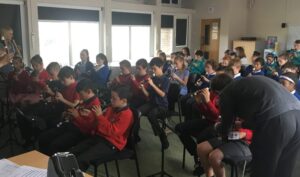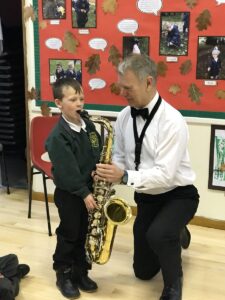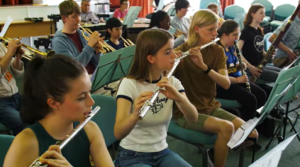Music Pedagogy: The Importance of Music Education in Primary Schools
An article that is part of NTMEH’s Music Pedagogy series

The Importance of Music Education in Primary Schools
Music education has a significant impact on children’s development. It not only brings joy but plays a critical role in shaping cognitive, emotional, and social skills. The UK’s National Plan for Music Education (NPME) highlights the need for every child to have access to high-quality music education, starting in primary school, and features how music education is essential for young learners and creates a broad range of benefits.
Cognitive Development
Music education enhances cognitive abilities above and beyond the music classroom. Research shows that learning music improves brain functions related to language, memory, and mathematics. Children who participate in music lessons often demonstrate stronger problem-solving skills, better pattern recognition, and enhanced memory retention, which are all vital for young cognitive development. Music helps children think creatively and critically, skills essential for learning and future innovation.
Emotional and Social Growth
Music plays a key role in developing emotional intelligence. Children express themselves through music, whether singing, playing an instrument, or composing. By having a creative outlet, children can improve their confidence and emotional resilience, essential for well-being. Children can better understand their emotions through music, which supports them in becoming more self-aware, and ultimately helping them navigate other areas of their lives.
Socially, music education teaches cooperation and collaboration. Group music activities such as choirs or ensembles require children to work together, listen, and respond to others. This teamwork enhances communication skills, empathy, and respect for others’ contributions. The NPME stresses that music should be inclusive, enabling every child to thrive, regardless of background.

Cultural Diversity and Inclusivity
Music helps children understand and appreciate diversity by exposing them to various musical traditions, genres and cultures which allows children to develop a more inclusive worldview. Whether learning about classical compositions or world music, children gain cultural awareness and a deeper understanding of the global community they live in.
This cultural education promotes tolerance and respect, preparing students to engage meaningfully with the world around them. Music, in this sense, becomes a powerful tool for cultural integration and empathy.
Lifelong Skills and Enjoyment
Music education provides more than just short-term benefits; it fosters a lifelong appreciation of the arts. Through early exposure to music, children develop skills that stay with them for life, including discipline, creativity, and emotional expression. Whether they pursue a career in music or simply enjoy it as a hobby, the lessons learned during primary school remain valuable. These values are emphasised by the NPME which highlights the importance of progression, encouraging students to continue their musical journey beyond primary school.

In conclusion, music education in primary schools is vital for developing well-rounded, creative, and emotionally intelligent children. It not only boosts cognitive skills but also fosters social and emotional growth, teamwork, and cultural awareness. The National Plan for Music Education envisions a future where every child can experience these benefits, positioning music education as a fundamental part of their overall development.
Investing in music education is an investment in a future generation of thinkers, creators, and empathetic individuals. Music helps shape children into adaptable, inclusive, and thoughtful adults who will carry these values into the wider world.
Sources
Department for Education. “National Plan for Music Education.”

